Professional Basement Excavations in Washington, DC
Here's what most contractors don't tell you about basement excavation in DC: it's not just about digging a hole. Last month, we watched a crew from Virginia spend three days fighting with clay soil that turned into concrete during a dry spell. They'd never worked with DC's unique ground conditions before, and it showed in their timeline and their client's final bill.
At BBCDC Construction & General Contractors, we've been digging basements in the District since 2003. Over those years, we've learned that every neighborhood has its own personality underground. The clay near Dupont Circle behaves differently than what you'll find in Capitol Hill, and both are nothing like the soil conditions we encounter in Shaw.
Why Choose BBCDC Construction & General Contractors for Basement Excavations in Washington, DC
We're based at 3418 13th St NW, which means we're literally in the neighborhood when projects need attention. That's more valuable than you might think. When a water main breaks three blocks away and affects your excavation's drainage plan, we're there in fifteen minutes, not two hours.
DC's clay soil is famous for giving contractors headaches. It swells when wet, shrinks when dry, and generally acts like it has a mind of its own. But once you understand its patterns—and we've had twenty years to study them—you can work with it instead of against it. The key is timing your excavation phases with seasonal moisture patterns and using techniques that accommodate the soil's natural movement.
Our complete excavating services cover everything from simple utility trenches to complex foundation work. This matters because basement excavations rarely happen in isolation. Maybe you need better drainage around your foundation, or perhaps the excavation reveals structural.
issues that need addressing. Having one crew that understands how all these elements fit together saves time and prevents miscommunication.
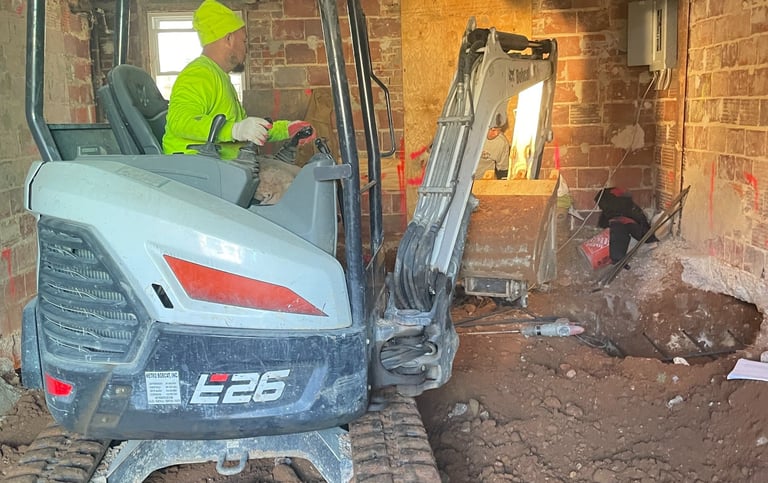

Understanding DC's Unique Basement Excavation Challenges
Let's talk about what makes DC different. First, the soil. DC sits on clay that geologists call "plastic clay"—it changes its mind about being solid depending on how much moisture it contains. During spring rains, we've seen clay soil double in volume. Come July, that same soil can crack like a dried riverbed.
Historic preservation rules add another wrinkle. Try explaining to a homeowner on Q Street why their basement excavation needs three different permits and approval from two historic boards. It's not bureaucracy for the sake of bureaucracy—these neighborhoods have architectural integrity that's worth protecting. But navigating these requirements takes experience with the actual people who make these decisions.
Underground utilities in DC are like archaeological layers. You've got modern fiber optic cables running next to gas lines from the 1950s, all crossing over water mains that might date back to the 1920s. City utility maps help, but they're not always accurate. We've learned to expect surprises and budget time for careful excavation around questionable areas.
The water table varies dramatically across DC. Properties near Rock Creek or the Potomac deal with different groundwater issues than homes on higher ground near 16th Street. These differences affect excavation depth, waterproofing requirements, and drainage design.
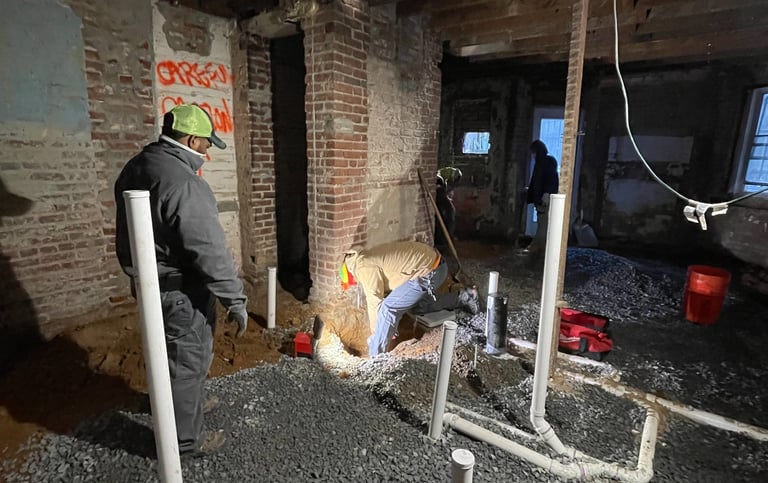

Our Comprehensive Basement Excavation Process
Every project starts with soil analysis. Not just a visual inspection—actual samples that tell us soil composition, moisture content, and bearing capacity. This data drives every decision from excavation technique to waterproofing strategy.
We use hydraulic excavators with rubber tracks for most DC projects. Steel tracks tear up sidewalks and driveways, which matters when you're working in dense neighborhoods where every square foot of hardscape costs money to replace. The hydraulic systems give us precise control when working around existing foundations or utility lines.
Waterproofing happens during excavation, not after. We install drainage systems and moisture barriers as we dig, creating integrated systems that work with local water table conditions. This approach costs less than retrofitting waterproofing and creates more effective long-term protection.
Soil stabilization becomes crucial when you're excavating in clay during wet seasons. We use lime treatment and proper grading techniques to create stable working conditions. Rushing this step causes problems that can add weeks to a project timeline.
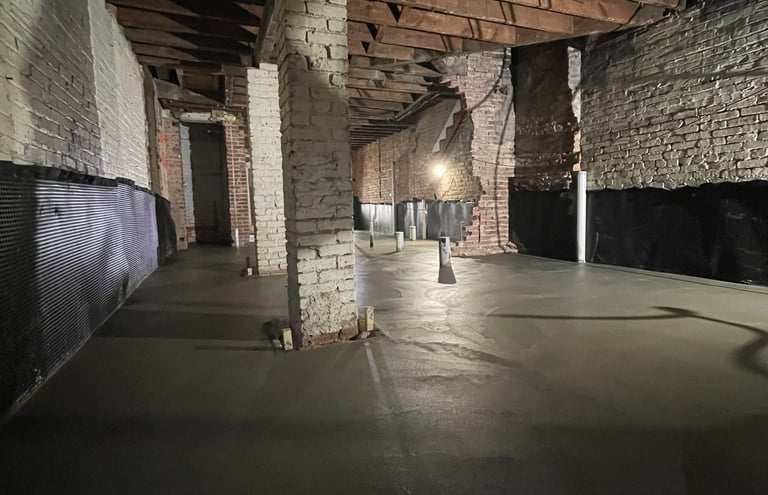

Basement Excavation Applications in Washington, DC Homes
DC's housing market has made basement space incredibly valuable. We've seen basement conversions add $50,000 to $100,000 in property value when done correctly. The key word is "correctly"—poorly executed basement work can actually decrease property value.
Legal bedroom space requires specific ceiling heights and egress windows. DC building code requires at least 7.5 feet of ceiling height and emergency exits that meet specific size requirements. These regulations drive excavation depth decisions and affect overall project costs.
Rental unit conversions have become popular as homeowners look for income opportunities. Creating a separate entrance involves more extensive excavation work, particularly around entrance areas where you need proper drainage and accessibility compliance.
Many of our projects involve improving existing basements that were finished decades ago with different standards. Lowering floor levels by 12 to 18 inches can transform a cramped basement into comfortable living space. This work requires careful analysis of existing foundation systems and often involves underpinning techniques.
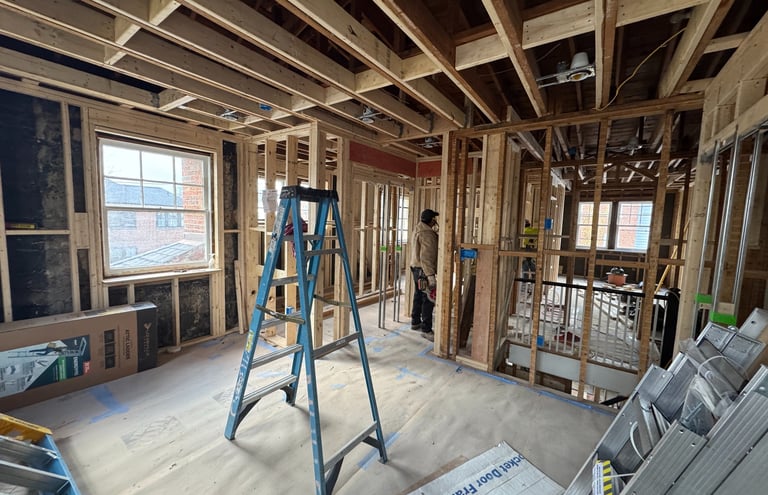

DC Neighborhood Expertise
Capitol Hill's brick construction requires special attention during excavation. Those 19th-century foundations were built with techniques that modern contractors often don't understand. We've learned to work around original construction methods while creating modern, functional spaces.
Georgetown presents unique challenges because of its age and topography. Some properties sit on stone foundations that are over 150 years old. The neighborhood's elevation changes create drainage issues that affect excavation planning, especially for properties that slope toward the Potomac.
Adams Morgan's housing stock varies dramatically from block to block. Victorian row houses need different approaches than the early apartment buildings scattered throughout the neighborhood. Soil conditions can change significantly even within a single block, influenced by original grading work done when the area was developed.
Shaw has seen extensive renovation activity over the past decade. We've worked on everything from simple ceiling height improvements to complete basement conversions that double a home's usable space. The neighborhood's mix of housing types means every project teaches us something new.
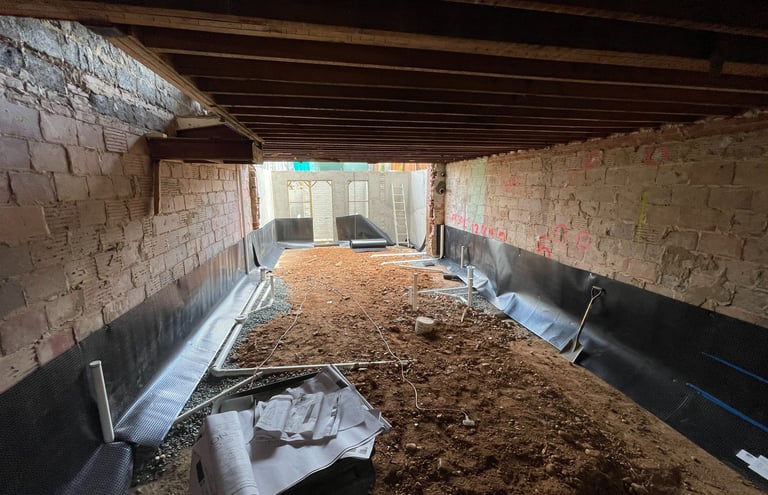

Building Science and Structural Integrity
Moisture control drives most of our excavation decisions. DC's humid climate creates perfect conditions for mold, rot, and structural damage if moisture management systems aren't designed properly. We've seen too many basement projects fail because contractors focused on aesthetics without understanding long-term moisture implications.
Foundation reinforcement during excavation requires structural engineering analysis. Most DC homes were built with foundation systems that can handle additional loads, but modifications need proper engineering to maintain structural integrity. We work with structural engineers who understand local building techniques and soil conditions.
Thermal performance has become increasingly important as energy costs rise. Proper insulation and thermal barriers during excavation can significantly improve a home's overall energy performance. These systems need integration with moisture management strategies to avoid creating condensation problems.
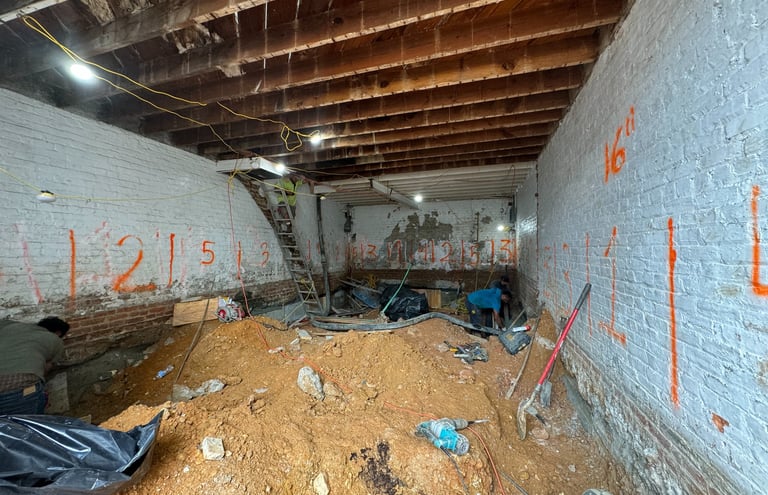

Permits and Compliance in Washington, DC
DC's permitting process has its own rhythm. We've learned which submissions get priority review and how to present plans that address common reviewer concerns upfront. This knowledge can save weeks from project timelines.
Historic preservation reviews add complexity to most projects in established neighborhoods. The review board cares about specific things—visual impact, structural integrity, and historical authenticity. Understanding these priorities helps us design projects that meet functional goals while satisfying preservation requirements.
Zoning regulations affect excavation depth, ceiling heights, and egress requirements. These rules can significantly impact project costs if not addressed during initial planning. We help homeowners understand these constraints and find solutions that work within existing regulations.
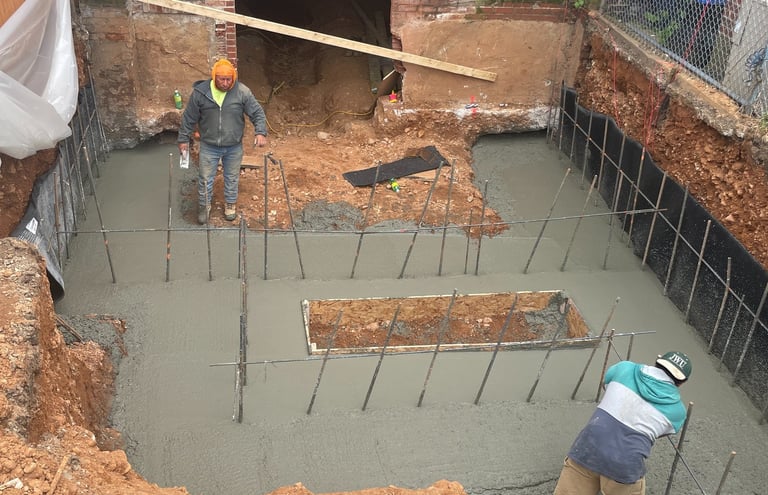

Why DC Homeowners Choose BBCDC Construction & General Contractors
Local expertise matters more in DC than in most markets because the challenges are so location-specific. We've built relationships with permitting offices, utility companies, and specialty suppliers that help projects run smoothly. These connections come from years of consistent work in the local market.
Our DC License #410521000429 represents more than regulatory compliance—it demonstrates commitment to maintaining professional standards in a competitive market. These credentials require ongoing education and adherence to evolving safety and building practices.
Working as a full-service construction company means we can handle related work that often accompanies basement excavation projects. Foundation repairs, drainage improvements, and structural modifications all require similar expertise and often make sense to complete simultaneously.
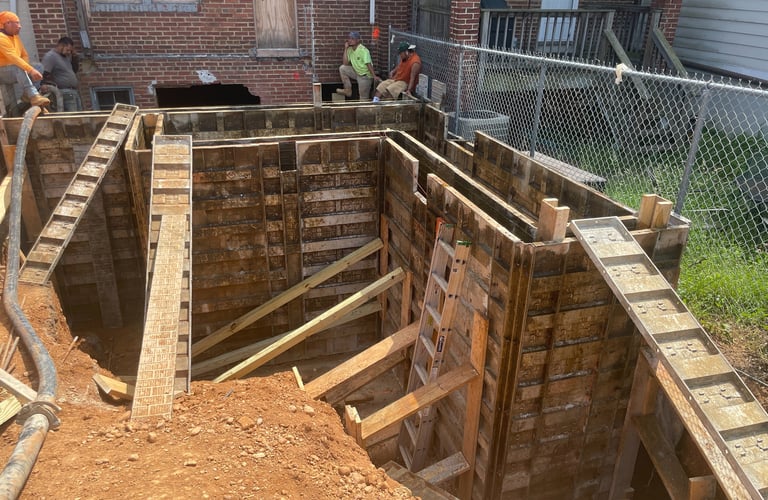

Getting Started with Your Basement Excavation Project
Initial consultations involve more than measuring spaces and discussing goals. We assess existing structural systems, evaluate soil conditions, and identify potential challenges that might affect project scope. This upfront analysis prevents most surprises that can derail projects later.
Project timelines in DC typically run six weeks to four months, depending on complexity and permitting requirements. Historic district reviews can add several weeks to approval processes, but this time is usually well-spent ensuring projects meet all requirements before construction begins.
Cost factors include excavation depth, soil conditions, structural requirements, and finishing levels. (1) We provide detailed breakdowns that help homeowners understand where their investment goes and why certain choices affect overall project costs. Transparent pricing prevents misunderstandings and helps homeowners make informed decisions.
Construction coordination requires attention to site access, material storage, and neighbor relations. DC's dense urban environment creates logistical challenges that suburban contractors often underestimate. We plan for these constraints and maintain clean, safe work sites throughout construction.
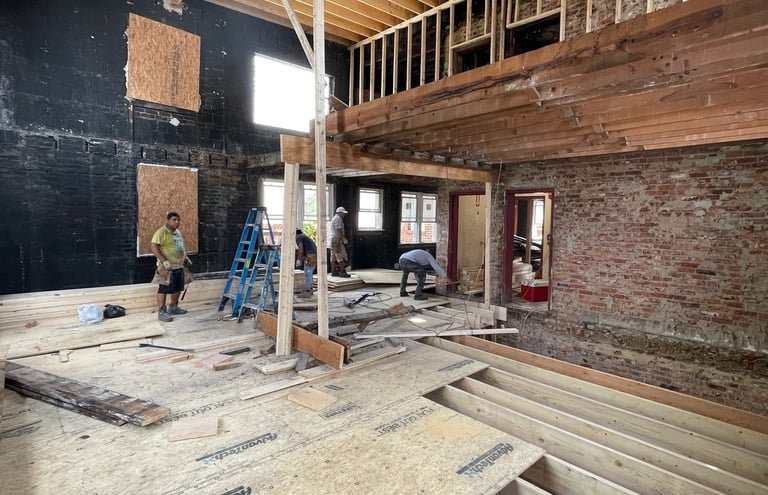

Your Trusted Partner for Basement Excavations in Washington, DC
At BBCDC Construction & General Contractors, twenty years of basement excavation work in DC has taught us that every project is unique, but success principles remain consistent: thorough planning, respect for local conditions, and attention to details that separate good work from great work.
Our location at 3418 13th St NW means we're never far from our projects. This proximity allows quick response to questions or concerns and maintains the close communication that successful projects require.
Ready to explore what's possible with your basement space? Call us at (202) 350-0344 to schedule a consultation. We'll assess your property, discuss your goals, and outline a realistic approach for transforming your basement into the functional space you need.
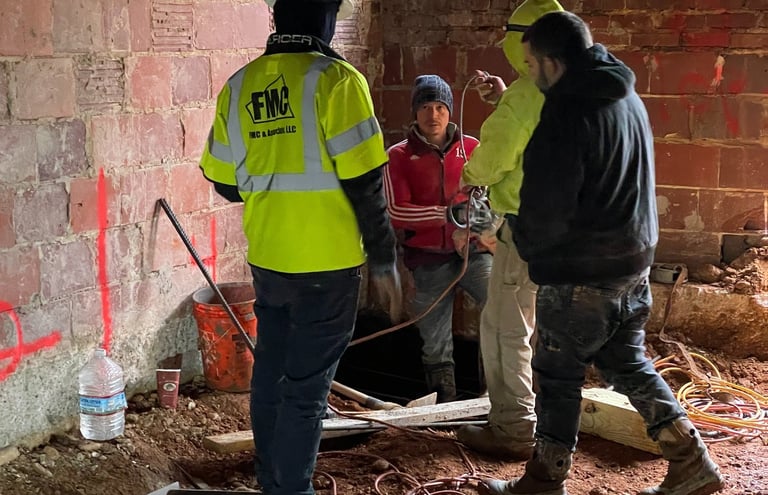

EPA LEAD-BASED PAINT RENOVATION, REPAIR, AND PAINTING ACTIVITIES #NAT-F254732-1
DISADVANTAGED BUSINESS ENTERPRISE (DBE)
DC CERTIFIED BUSINESS ENTERPRISE (CBE)
CERTIFICATION NUMBER: LSD34313092025
SMALL BUSINESS ENTERPRISE (SBE)
LOCAL BUSINESS ENTERPRISE (LBE)
DC LICENSE # 410521000429
CAGE CODE 8MRD4
MD MHIC 6178021
SERVING: Adams Morgan, DC, American University Park, DC, Bellevue, DC, Berkeley, DC, Bethesda, MD, Bloomingdale, DC, Brightwood, DC, Brightwood Park, DC, Brookland, DC, Burleith, DC, Buzzard Point, DC, Capitol Hill, DC, Cathedral Heights, DC, Chevy Chase, DC, Chinatown, DC, Cleveland Park, DC, Columbia Heights, DC, Crestwood, DC, Dupont Circle, DC, Eastern Market, DC, Eckington, DC, Edgewood, DC, Foggy Bottom, DC, Forest Hills, DC, Fort Totten, DC, Foxhall, DC, Friendship Heights, DC, Georgetown, DC, Glover Park, DC, H Street Corridor, DC, Hill East, DC, Ivy City, DC, Kalorama, DC, Kent, DC, Kingman Park, DC, LeDroit Park, DC, Logan Circle, DC, Manor Park, DC, McLean Gardens, DC, Michigan Park, DC, Mount Pleasant, DC, Navy Yard, DC, NoMa, DC, Observatory Circle, DC, Palisades, DC, Penn Quarter, DC, Petworth, DC, Potomac, MD, Rockville, MD, Shaw, DC, Shepherd Park, DC, Silver Spring, MD, Sixteenth Street Heights, DC, Southwest Waterfront, DC, Spring Valley, DC, Takoma, DC, Takoma Park, MD, Tenleytown, DC, The Wharf, DC, Trinidad, DC, U Street, DC, Union Market, DC, Van Ness, DC, Wesley Heights, DC, West End, DC, Woodley Park, DC, Woodridge, DC
HOURS
Monday: 8:00 AM – 8:00 PM
Tuesday: 8:00 AM – 8:00 PM
Wednesday: 8:00 AM – 8:00 PM
Thursday: 8:00 AM – 8:00 PM
Friday: 8:00 AM – 8:00 PM
Saturday: 8:00 AM – 8:00 PM
Sunday: Closed
COPYRIGHT BRANDS BUILD CULTURE DC, LLC. 2025
ALL RIGHTS RESERVED.
